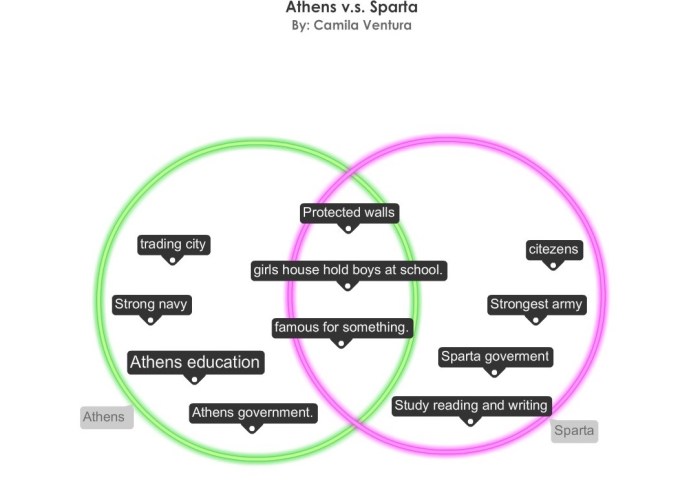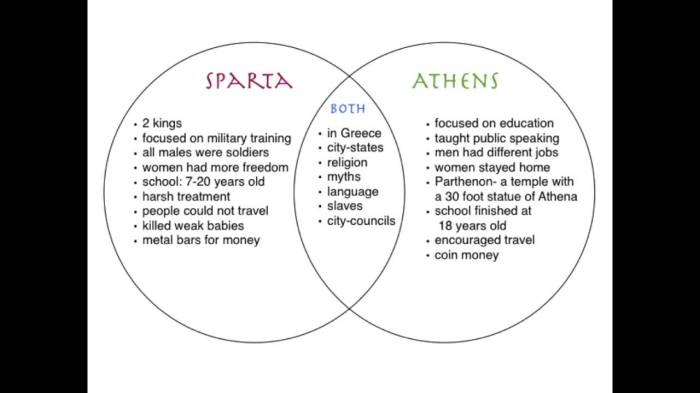The Venn diagram of Athens and Sparta serves as a compelling lens through which to explore the intriguing history and multifaceted relationship between these two iconic city-states of ancient Greece. This captivating narrative delves into their origins, political systems, social structures, and the profound impact they had on Western civilization.
Athens and Sparta emerged as distinct entities with contrasting ideologies and societal norms, yet they shared a common cultural heritage and military prowess. Their interactions were marked by both cooperation and conflict, shaping the course of Greek history and leaving an enduring legacy that continues to resonate today.
Historical Background
Athens and Sparta emerged as prominent city-states in ancient Greece, shaping its history and culture. Athens, located in Attica, gained prominence as a center of trade and intellectual pursuits, while Sparta, situated in Laconia, became renowned for its military prowess and disciplined society.
Athens’ origins trace back to the Mycenaean period, while Sparta’s roots lie in the Dorian invasion. Over time, Athens developed a democratic political system, fostering philosophy, arts, and literature. Sparta, on the other hand, adopted an oligarchic government focused on military training and discipline.
Venn Diagram of Athens and Sparta
The Venn diagram below illustrates the similarities and differences between Athens and Sparta:
- Overlapping Section (Shared Characteristics):Cultural values, religious beliefs, military traditions
- Non-Overlapping Section (Unique Characteristics):Athens: Democracy, philosophy, arts; Sparta: Militarism, discipline
Shared Characteristics

Despite their distinct political systems, Athens and Sparta shared several commonalities:
- Cultural Values:Both valued honor, courage, and respect for tradition.
- Religious Beliefs:They worshipped the same gods and participated in similar religious festivals.
- Military Traditions:Both had a strong military ethos and fought in major conflicts, such as the Persian Wars.
Unique Characteristics: Venn Diagram Of Athens And Sparta

Athens and Sparta also exhibited significant differences:
- Athens:
- Democracy:Direct participation of citizens in government
- Philosophy:Home to influential thinkers like Socrates and Plato
- Arts:Renowned for its architecture, sculpture, and drama
- Sparta:
- Militarism:Focus on military training and discipline
- Oligarchy:Rule by a small elite
- Rigid Social Structure:Strict division of society into citizens, non-citizens, and slaves
Interactions between Athens and Sparta
The relationship between Athens and Sparta was complex and often fraught with tension:
- Alliances:They allied during the Persian Wars, fighting side-by-side against a common enemy.
- Conflicts:The Peloponnesian War (431-404 BC) was a major conflict between the two city-states, with Sparta emerging victorious.
- Periods of Cooperation:Despite their differences, they occasionally cooperated on matters of mutual interest, such as maintaining peace and stability in the region.
Legacy and Impact
Athens and Sparta left an enduring legacy on Western civilization:
- Philosophy:Athens’ contributions to philosophy laid the foundation for Western thought.
- Literature:Athenian dramatists and poets shaped the development of Western literature.
- Art:Athenian architecture and sculpture inspired countless artists and architects.
- Political Thought:Sparta’s military prowess and discipline influenced military strategies and political theories.
Query Resolution
What were the key differences between Athens and Sparta?
Athens emphasized democracy, philosophy, and the arts, while Sparta prioritized militarism and discipline.
How did the shared cultural values of Athens and Sparta influence their interactions?
Their common religious beliefs and military traditions fostered a sense of unity and cooperation, even amidst their political differences.
What was the significance of the Peloponnesian War between Athens and Sparta?
This conflict marked a turning point in Greek history, weakening both city-states and paving the way for the rise of Macedonia.